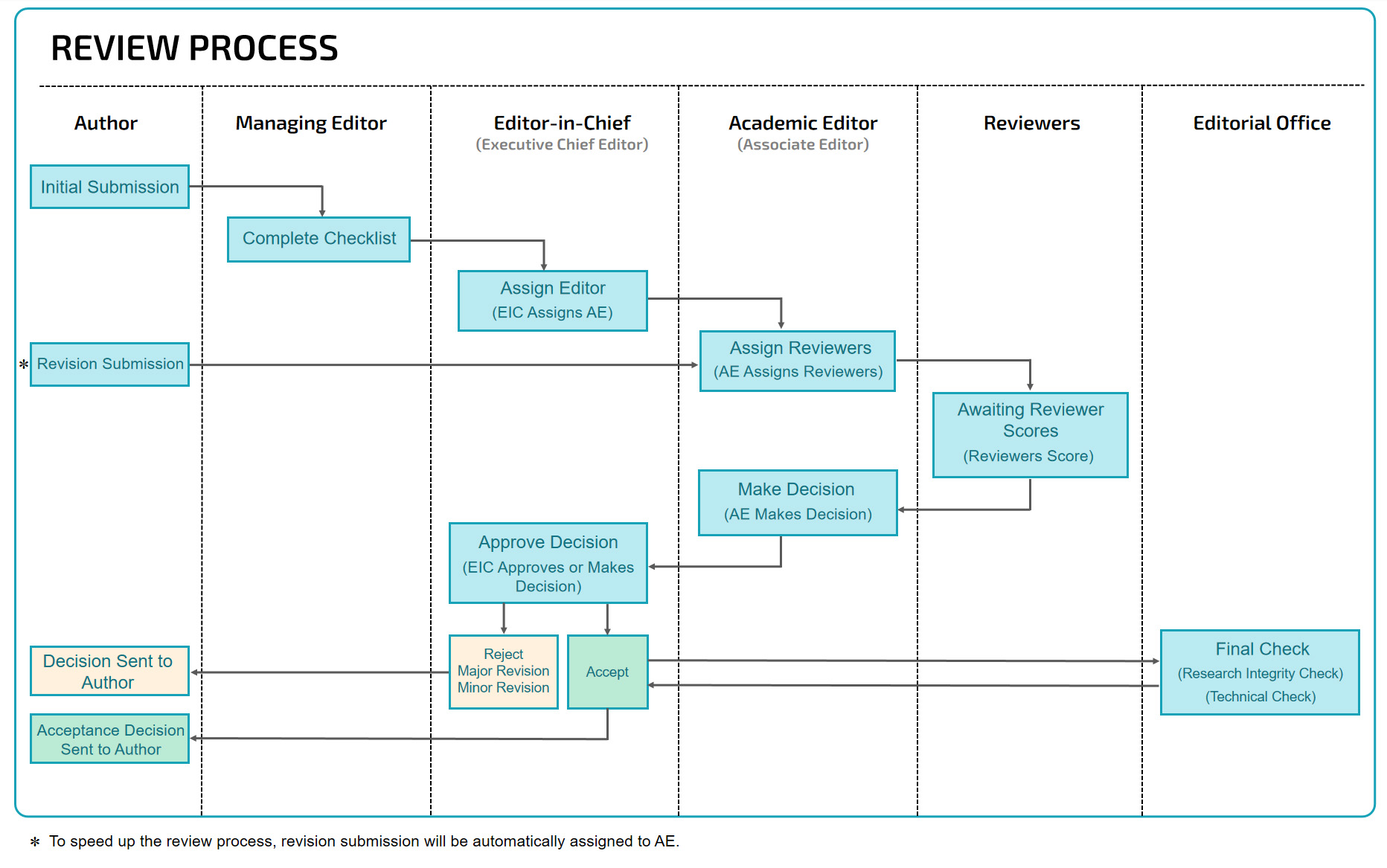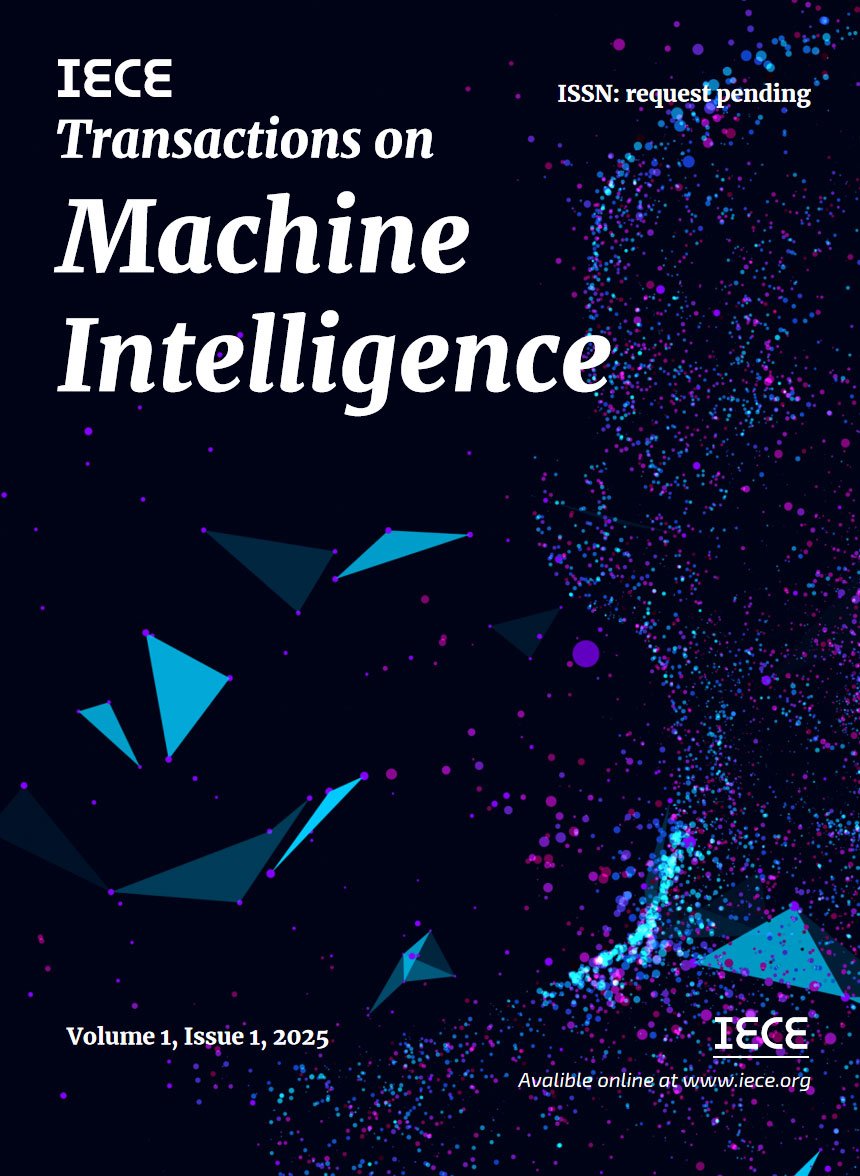Editorial Workflow
Editorial Procedure and Peer Review
IECE Transactions on Machine Intelligence (TMI) implements a rigorous peer review process, which in most cases is a single-blind assessment with at least two independent reviewers, followed by a final acceptance/rejection decision by the Editor-in-Chief. The Editor-in-Chief is responsible for the academic quality of the publication process, including approving or rejecting the decision of the Academic Editor/Associate Editor. The publication ethics and publication malpractice statement regulate ethical behavior based on Committee on Publication Ethics (COPE)´s Best Practice Guidelines and is supplemented by IECE’s Instructions for Authors.
A flow chart of the review process is given below:

Initial Checks
All submitted manuscripts received by the Editorial Office will be initially checked by a Managing Editor before the manuscripts are sent for peer-review to decide whether they are correctly formatted/prepared, follow the ethical policies of the journal and also fit the scope of the journal, and whether they are scientifically sound. Manuscripts that do not meet the journal's ethics policy or do not qualify the standards or do not fit the scope of the journal will be rejected before peer-review. Manuscripts that are inadequately prepared will be returned to the author(s) for revision and resubmission. After the initial check, the Managing Editor will send the qualified manuscripts to the journals' Editor(s). Editor(s) will make initial decisions, and qualified manuscripts will be sent for peer-review. No judgment on the significance or potential impact of the work will be made at the initial check stage. Rejection decisions at this stage will be verified by the Editor(s).
Peer Review
All manuscripts considered for publication in our journals, including invited papers, go through a stringent and thorough peer-review procedure. After an initial check, the manuscript is assigned to a handling editor, who then assigns it to reviewers and oversees the peer review. Authors may be asked to make minor or even major revisions before a handling editor decides whether to proceed with subsequent rounds of peer review. The final decision regarding acceptance is made by the journal’s Editor(s).
At least two independent experts who are not part of the journal’s editorial staff take part in the peer-review procedure. The procedure is single blind in nature, meaning that the reviewers know the identities of the authors of the work that they are assessing, but the authors do not know the identities of the reviewers. The comments generated during peer review remain confidential and may only be disclosed with the express agreement of the reviewer.
Editor(s) may consider assigning a manuscript to reviewers whom the authors suggest. In any case, the reviewers must have no conflicts of interest. In particular, scholars who have published joint work with any of the authors two years prior to submission of the manuscript or who are currently collaborating with any researchers at any of the authors’ institutions are not eligible to serve as reviewers.
Reviewers’ Responsibilities
Reviewers are expected
to contribute to the orderly running and reputation of the journal and to further its quality-driven mission by evaluating manuscripts objectively and in a timely manner;
to maintain the confidentiality of any information supplied by the editor or author, to destroy the manuscript after their reviews, and not to copy it or to use or disseminate unpublished information, arguments, or interpretations contained therein without express permission to do so;
to make clear and justify the bases of their evaluations;
to be aware of potential conflicts of interest (i.e., financial, institutional, collaborative, or other relationships between a reviewer and an author) and to bring any such conflicts to the editor’s attention, if necessary ceasing their work on the manuscript;
to notify the Associate Editor and Editors-in-Chief immediately should they become aware of any scientific misconduct, fraud, plagiarism, or other unethical behavior related to the manuscript.
Editorial Decisions
All original articles, reviews, and other types of papers published in TMI go through the peer-review process. The decision regarding publication is based on a minimum of two reviewers’ comments and may take one of four forms.
Accept
The paper is in principle accepted based on the reviewers’ comments. The decision to publish is not based solely on the scientific validity of an article’s content but may also take into account such considerations as its extent and importance.
Minor Revision
The paper is to be accepted after it has undergone minor revisions specified in the reviewers’ comments. In this situation, authors have five days to complete the minor revisions along with point-by-point responses to the comments or to provide a rebuttal letter.
Major Revision
The paper may be accepted provided that it is thoroughly revised. In this case as well, the authors must provide a point-by-point response or rebuttal to the comments, and the revised version is sent to the same reviewer for further comment.
Reject
Articles are rejected even after revision when they are found to have serious flaws and/or to make no substantial original contribution to the scholarship.
The editors are authorized to reject any manuscript if its subject is deemed inappropriate, it is of poor quality, or its results are proved to be erroneous. Editors themselves are prevented from serving as external reviewers of manuscripts in order to ensure that every manuscript submitted to the journal undergoes a well-informed and unbiased peer-review process. Thus, any manuscript must be recommended by, usually, two or more external reviewers along with the handling editor before it is accepted for publication in its final form.
In cases where authors do not respond within the specified timeframe, we consider this a sign of author disengagement. We may temporarily decline the submission to uphold the timeliness and quality of our academic discourse. Authors are welcome to reconsider and resubmit their work; however, it will be subjected to a fresh peer review process.
Online First
Most articles accepted and ready for publication in TMI are published Online First, prior to the assignment to one issue. Articles published Online First are copyedited and proofed by the author(s) before being published. Online First articles can be cited by the article’s Digital Object Identifier (DOI). Every article has a unique DOI which is the permanent identifier of all versions of that article. A DOI will always be resolved to the latest version.




